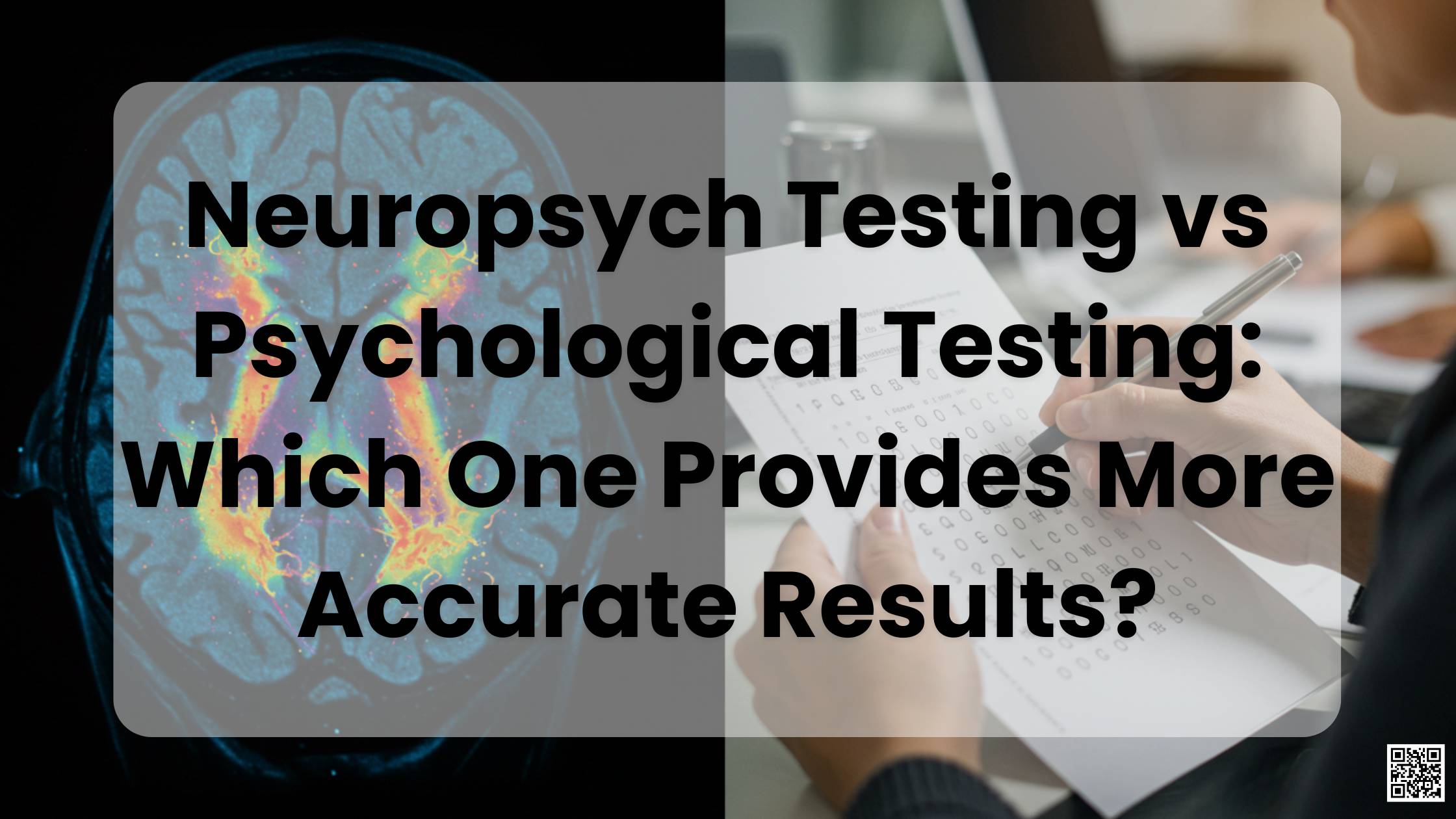People often mix up neuropsychological testing and psychological testing. Though they sound similar, these assessment types serve different purposes and measure different things.

The Basics of Each Assessment Type
Before comparing accuracy, it helps to understand what each evaluation actually involves and measures.
What Psychological Testing Covers
Psychological testing primarily looks at emotional health, personality traits, and behavioral patterns. These assessments help identify various mental health conditions and explore how people function emotionally.
The testing process typically involves questionnaires about symptoms, interviews about personal history, and sometimes exercises designed to reveal patterns in thinking and feeling. Whether conducted by a psychiatrist in the Bronx or any other borough, a psychologist analyzes these results to understand emotional functioning and mental health concerns.
These evaluations help diagnose conditions like depression, anxiety disorders, and personality disorders. They also provide information about how someone processes emotions, handles stress, and relates to others—all crucial information for therapy planning.
What Neuropsychological Testing Examines
Neuropsych testing focuses on cognitive functions and how they relate to brain systems. These comprehensive evaluations measure specific abilities like attention, memory, language, problem-solving, and information processing.
The assessment involves standardized tasks that directly measure cognitive performance. Rather than just asking if someone has memory problems, these tests measure actual memory functioning compared to others of similar age and background.
Neuropsychologists—psychologists with specialized training in brain-behavior relationships—conduct these evaluations. They help identify conditions affecting thinking abilities, such as ADHD, learning disorders, dementia, or effects of brain injury.
Major Differences in Approach and Focus
Several key distinctions separate neuropsych testing vs psych testing, affecting which approach might give more accurate information for specific questions.
Different Clinical Questions They Answer
Psychological assessment helps answer questions about emotional and behavioral functioning:
- Why does someone feel depressed or anxious?
- What personality patterns affect their relationships?
- How do they cope with stress and difficult emotions?
- What type of therapy might help them most?
Neuropsych testing addresses questions about thinking abilities and brain functioning:
- Why does someone struggle with memory, attention, or learning?
- Do their cognitive difficulties match patterns seen in specific conditions like ADHD?
- How severely has a brain injury affected their thinking abilities?
- Can they safely live independently or make important decisions?
Different Testing Methods and Tasks
The methods used in these assessment types differ considerably.
Psychological testing relies heavily on self-reporting through questionnaires and interviews. This approach gathers rich information about subjective experiences but depends on the person’s willingness and ability to report accurately.
Neuropsych vs psych testing differs fundamentally in this regard. Neuropsychological assessment uses performance-based measures that directly test cognitive abilities. This reduces certain reporting biases but might feel less connected to real-world functioning.
Accuracy Considerations for Different Concerns
Neither approach is inherently more accurate. Each provides better information for certain types of questions.
When Psychological Testing Gives Better Answers
For primarily emotional or behavioral concerns, psychological testing typically provides more relevant and accurate information.
Someone experiencing mood swings, for instance, would benefit more from psychological assessment than neuropsych testing. The psychological evaluation would help distinguish between conditions like bipolar disorder, borderline personality features, or adjustment difficulties—distinctions with important treatment implications.
Psychological assessment often better captures how symptoms affect daily functioning and relationships. The information gathered connects more directly to psychotherapy treatment planning than cognitive test results alone.
Most psychological tests include validity measures that help determine whether someone presents an accurate picture of their symptoms. These validity scales identify exaggeration, minimization, or inconsistent reporting patterns.
When Neuropsychological Assessment Provides Superior Information
For cognitive complaints or neurological conditions, neuropsych testing vs psychological testing typically yields more precise information.
An older adult with memory concerns benefits more from neuropsychological assessment than psychological testing. The neuropsych evaluation helps distinguish between normal aging, mild cognitive impairment, or dementia—differences with significant implications for treatment and planning.
Neuropsychological assessment provides objective data less affected by limited self-awareness. Even if someone lacks insight into their cognitive difficulties, performance tests demonstrate actual capabilities.
The structured, standardized nature of neuropsychological tests allows comparison to established norms, helping identify subtle cognitive deficits that might otherwise go unnoticed in casual conversation or brief screening.
Practical Factors Affecting Assessment Choice
Beyond accuracy, several practical considerations influence choices between neuropsych testing vs psych testing.
Time Requirements and Availability
Neuropsychological assessment typically requires significant time, often spanning multiple appointments. A comprehensive evaluation might take 6-8 hours of direct testing plus additional time for scoring and interpretation.
Psychological assessment generally takes less time, typically 2-4 hours of direct evaluation. The more focused nature makes these evaluations more readily available in many communities.
Cost Differences and Insurance Coverage
The comprehensive nature of neuropsych testing makes it typically more expensive than psychological assessment. Costs can range from $1,500 to $4,000 depending on evaluation scope and geographic location.
Psychological testing usually costs less, with prices ranging from $500 to $2,000 depending on assessment complexity. These lower costs and shorter timeframes sometimes make psychological testing more accessible for people with limited insurance coverage.
Insurance plans vary widely in their coverage for both assessment types. Many plans limit the number of testing hours they’ll cover, affecting which evaluation approach remains financially feasible.
Specialized Populations and Considerations
For certain populations, the accuracy differences between these assessment types become particularly important.
Children and Adolescents
For young people with learning or attention problems, neuropsych testing often provides more useful information than psychological testing alone. The neuropsychological assessment helps identify specific learning disorders, ADHD, or other neurodevelopmental conditions affecting academic performance.
For children with primarily emotional or behavioral concerns, psychological assessment often yields more relevant information. The psychological evaluation helps identify conditions like anxiety disorders, depression, or adjustment problems affecting social and emotional development.
Older Adults
For older individuals with memory concerns, neuropsych testing vs psych testing provides more specific and relevant information. The neuropsychological assessment helps distinguish between normal aging, mild cognitive impairment, and various forms of dementia.
For seniors struggling primarily with mood changes, psychological assessment often gives more useful information about late-life depression, adjustment to life changes, or anxiety disorders.
Finding Qualified Assessment Providers
The assessment quality depends heavily on provider qualifications and experience.
Psychological testing should be conducted by licensed psychologists with specific training in psychological assessment. These professionals typically have doctoral degrees in clinical or counseling psychology and supervised experience in psychological testing.
Neuropsych testing requires additional specialized training. Look for providers with formal postdoctoral fellowship training in neuropsychology or substantial supervised experience with neuropsychological assessment.
Healthcare providers like primary care physicians, psychiatrists, and therapists can often suggest qualified assessment professionals based on specific concerns and needs.
Combining Approaches for Complex Cases
For complex presentations involving both cognitive and emotional components, combining elements from both assessment traditions sometimes provides the most comprehensive picture.
A thorough assessment might include cognitive measures to identify specific thinking difficulties alongside emotional measures to understand how these difficulties affect mood and adjustment. This integrated approach helps clarify relationships between cognitive and emotional functioning.
Unfortunately, insurance limitations sometimes force difficult choices about assessment priorities, making combined approaches less feasible than ideal.
Conclusion
Both neuropsych testing and psychological testing provide valuable clinical information when matched appropriately to assessment questions. Neither approach is universally more accurate; each excels at answering different types of clinical questions.
For emotional and behavioral concerns, psychological testing typically provides more relevant information. For cognitive complaints and neurological conditions, neuropsychological assessment usually yields more accurate and useful results.
The most helpful assessment approach depends on what questions need answering. Working with qualified professionals who understand the strengths and limitations of their assessment methods helps ensure the most accurate and useful results possible.






